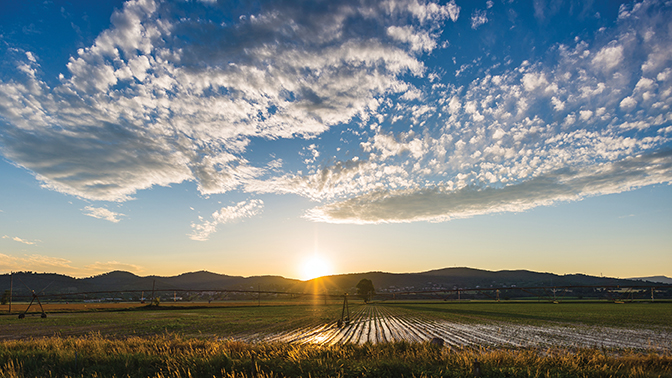The Daugherty Water for Food Institute:

Feeding a Growing World by Jesse Starita
Picture a husky man in jeans and a flannel shirt with what looks like a Proton Pack from The Ghostbusters movies strapped to his shoulders as he traverses a Nebraska cornfield. Got it? This is science without fiction: the backpack holds a mobile cosmic ray device that measures subatomic neutron particles, which provides an accurate, real-time estimate of water content in the soil beneath his feet. The man is Dr. Trenton Franz, a former college football offensive lineman who is now a University of Nebraska-Lincoln hydrogeophysicist and one of the 80 Faculty Fellows of the Water for Food Global Institute at the University of Nebraska.
he institute supports and shares research like Trenton’s to address the global challenge of achieving food security with limited water resources. In the next 35 years, the world’s population is expected to grow beyond 9 billion. Water shortages already occur in many of the world’s major food production areas and growing demands from municipal and industrial entities, environmental conservation groups and recreational water users are competing for this precious resource. At a time when agriculture must produce more food, water supplies are stretched to meet a variety of needs and a changing global climate.
Founded in 2010, the Water for Food Global Institute spans all campuses of the University of Nebraska to maximize the university’s vast education, research and outreach expertise in agriculture, water management, food science and natural resources. Furthermore, the Nebraska Water Center, which has a long track record of engagement with the people of Nebraska, is now an integral part of WFI. Working together with other universities and public and private sector organizations—locally, regionally and across the globe—the institute is developing innovative solutions to produce more food using water more efficiently.
The Water for Food Global Institute bridges the worlds of large-scale and smallholder agriculture, concentrating on impact areas that are vital to water and food security both in our state and globally:
Closing water and agricultural productivity gaps, building on the pioneering work of the Global Yield Gap and Water Productivity Atlas, as well as the University’s expertise in plant breeding and biotechnology development to improve drought tolerance and crop water productivity.
Enhancing high productivity irrigated agriculture, working, for example, to use remote sensing
to monitor and predict yield and water productivity levels in real time and implementing innovative projects in partnership with the private sector and social entrepreneurial groups in sub-Saharan Africa.
Improving groundwater management, drawing on the vast experience of Nebraska’s water governance institutions and farmers, as well as the University’s technical and policy expertise in the subject to inform and guide policymakers, managers, producers and the public.
Supporting public health and ecosystems management, ensuring that efforts to improve water and food security also advance public health and protect ecosystem integrity, bringing to bear the University’s expertise in natural resources management, water quality analysis and technology, and public health.
Research is at the core of WFI programs, finding new ways to sustainably manage water and increase food security, inform policy and give students hands-on experience in the lab and field. Collaborative research programs are currently underway in Nebraska and agricultural areas of the U.S., India, Brazil, China, sub-Saharan Africa, the Middle East and North Africa. These projects include increasing crop yields and water productivity using mapping, modeling and information systems; increasing the long-term productivity of crops and livestock in water-limited conditions; and improving drought management and climate change adaptation through monitoring, preparedness strategies and stronger early warning systems.
All together, 100 Faculty and Global Fellows and dozens of post-doctoral, graduate and undergraduate students within the University of Nebraska system—and internationally—are contributing to WFI’s research, engagement and education programs.
In addition to supporting and promoting the Fellows’ water and food related research projects and sharing news and data with a variety of stakeholders, the institute hosts an annual Water for Food Global Conference. These conferences bring together thought leaders and experts from around the world to discuss strategies for doubling our agricultural production by 2050 and doing it with less water than we use today.
The most recent conference included 350 participants from around the world and focused on the powerful impact that can be achieved through public-private partnerships in water for food research, technology and project development. Videos and photos from many of the conference sessions are available on the WFI website: waterforfood.nebraska.edu/2016-water-for-food-global-conference/.
Open to the public, the eighth Water for Food Global Conference will be held April 10-12, 2017, at Nebraska Innovation Campus. Titled “Water for Food Security: From Local Lessons to Global Impacts,” the conference will examine how and when insights and practices from one agricultural setting can be applied to another.
From research programs literally in the soil, to satellite moisture sensor technology in space, from policy development in community meetings, to knowledge shared through our conferences, the institute is producing results that matter—increasing food production with more effective and efficient use of water. Like millions of families around the globe, we want to put dinner on the table…for everyone.
You can learn more about the Water for Food Global Institute and join in the conversation about feeding our growing world through any of these online resources:
Follow @waterforfood on Twitter
Like us on Facebook
www.facebook.com/waterforfood
Find useful information on Pintrest
www.pintrest.com/waterforfood
Follow and submit comments on our blog
waterforfood.nebraska.edu/blog/category/blog/
Subscribe to our YouTube Channel
Youtube.com/waterforfood
Visit our website Waterforfood.nebraska.edu




Recent Comments